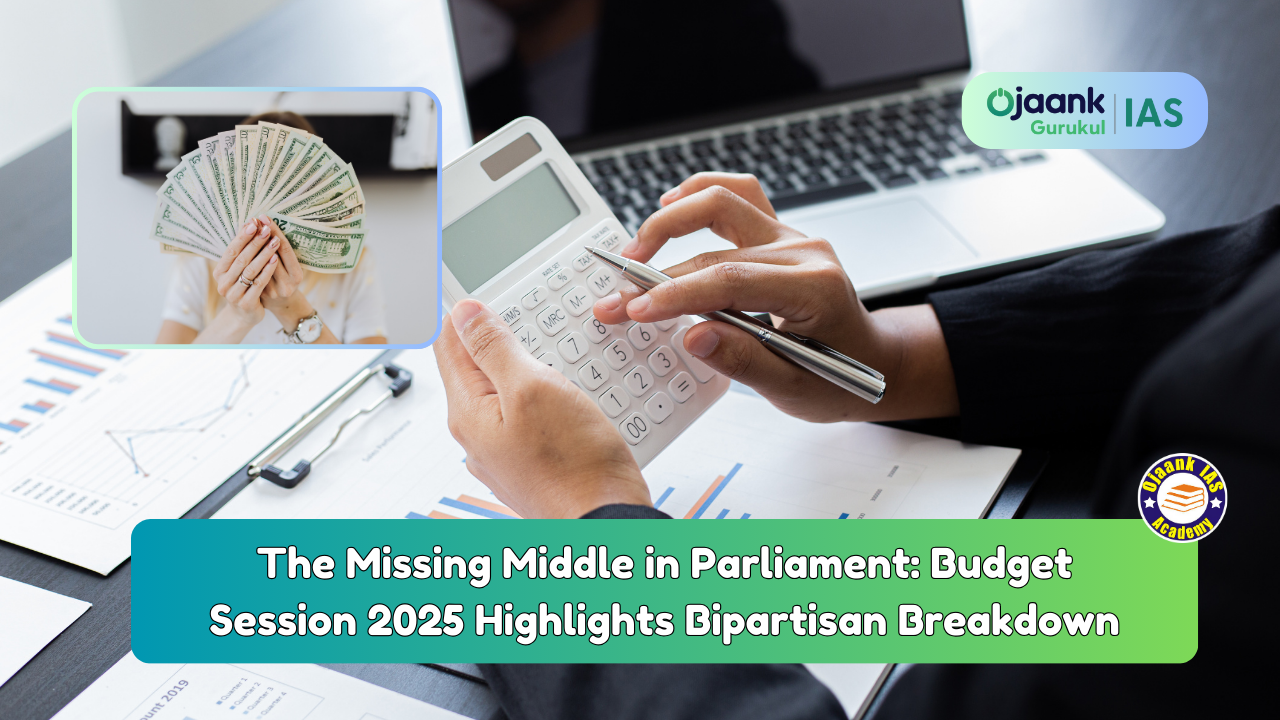The Missing Middle in Parliament: Budget Session 2025 Highlights Bipartisan Breakdown

Introduction: A Session of Contrasts and Consequences
The Budget Session of Parliament 2025 delivered a compelling contradiction. On the surface, the ruling party showcased procedural efficiency—debates extending past midnight, controversial bills cleared with confidence, and parliamentary chairs lauding the productivity. But beneath that gloss lay a deeper, more troubling reality: the near-total erosion of bipartisan consensus and a sharp increase in political and communal polarization.
While the session saw historic legislative pacing and rigorous debates, it lacked what every thriving democracy desperately needs—the missing middle. That is, the centrist space where dialogue, compromise, and common ground once flourished.
A Closer Look at the Legislative Highs
 The Waqf (Amendment) Bill 2025: More Than Just a Midnight Debate
The Waqf (Amendment) Bill 2025: More Than Just a Midnight Debate
The Waqf Bill consumed headlines and Parliament’s time in equal measure. Debated past midnight, it was one of the most discussed legislative measures of the session. While the ruling BJP counted the successful passage as a win, the atmosphere around it revealed a fractured polity:
-
Opposition parties, including the AIADMK and BJD, either voted against it or showed visible discomfort.
-
The BJD, usually a quiet fence-sitter, did not issue a whip, sparking internal dissent, especially in light of Naveen Patnaik’s previously stated opposition.
-
AIADMK’s opposition to the bill underlined its strategic distancing from BJP’s communal image to retain its minority voter base.
No Muslim MP, barring one nominated Rajya Sabha member, supported the bill. That glaring absence isn't just symbolic—it reveals a majoritarian legislative trajectory where key stakeholders are absent from the conversation.
Opposition's Unexpected Wins: Symbolic but Significant
Despite a BJP-dominated narrative, the Opposition emerged stronger in some aspects:
-
Managed to hold the floor on several key issues.
-
Attracted swing votes from neutral members on selected matters.
-
Demonstrated rare unity among its constituents.
This was particularly evident in the Manipur President’s Rule debate, also extended beyond midnight. It showcased both procedural commitment and rising tensions—especially considering the state's continued crisis.
Behind Closed Doors: Power Clashes and Protocol Breaches
Off-camera moments were equally telling. Business Advisory Committee meetings witnessed sharp spats. In one dramatic instance, Rajya Sabha Chairman Jagdeep Dhankhar walked out, an act that amplified the seriousness of the internal rifts.
The standoff between Congress and Lok Sabha Speaker Om Birla over the denial of adequate floor time to Rahul Gandhi, further punctuated the Opposition's claims of systematic suppression.
What the Budget Session Really Revealed
-
No Room for the Middle Ground:
The ideological center is evaporating. The absence of bipartisan efforts on even moderately contentious issues proves Parliament is now a battleground of extremes. -
Allies or Adversaries?
The BJP’s strained ties with allies like the AIADMK and BJD, juxtaposed with growing warmth from the TDP and JD(U), reveal a shifting coalition calculus ahead of the 2026 elections. -
Majoritarian Shadows:
The Waqf Bill debate exemplified exclusionary politics—legislating on minority issues without minority representation is a dangerous precedent. -
Democracy at a Crossroads:
This session deepened polarization. Instead of forging consensus, Parliament appears increasingly driven by agenda-based partisanship.
Why It Matters: The Death of Deliberative Democracy
In any mature democracy, Parliament is the crucible where ideas are tested, not throttled. The 2025 Budget Session showcased everything wrong with a winner-takes-all mindset. Efficiency cannot come at the cost of dialogue, representation, and inclusion.
The Waqf Bill could have been an opportunity for collaborative law-making. Instead, it became a political weapon.
Conclusion: The Call for Course Correction
India’s Parliament is losing its “middle ground”—the space where compromise lives, dialogue thrives, and nation-first politics exists. The 2025 Budget Session, while administratively successful, was democratically deficient.
What the country needs now isn’t just fast laws—but fair, inclusive, and empathetic governance. Until that’s restored, the missing middle will remain a dangerous void in India's democracy.
![]() Stay informed. Stay engaged. Democracy demands more than just watching—it needs your voice.
Stay informed. Stay engaged. Democracy demands more than just watching—it needs your voice.